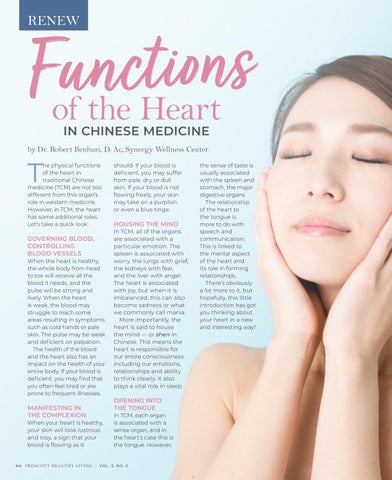Functions RENEW
of the Heart IN CHINESE MEDICINE
by Dr. Robert Benhuri, D. Ac, Synergy Wellness Center
T
he physical functions of the heart in traditional Chinese medicine (TCM) are not too different from this organ’s role in western medicine. However, in TCM, the heart has some additional roles. Let’s take a quick look:
GOVERNING BLOOD, CONTROLLING BLOOD VESSELS When the heart is healthy, the whole body from head to toe will receive all the blood it needs, and the pulse will be strong and lively. When the heart is weak, the blood may struggle to reach some areas resulting in symptoms such as cold hands or pale skin. The pulse may be weak and deficient on palpation. The health of the blood and the heart also has an impact on the health of your entire body. If your blood is deficient, you may find that you often feel tired or are prone to frequent illnesses.
MANIFESTING IN THE COMPLEXION When your heart is healthy, your skin will look lustrous and rosy, a sign that your blood is flowing as it
should. If your blood is deficient, you may suffer from pale, dry or dull skin. If your blood is not flowing freely, your skin may take on a purplish or even a blue tinge.
HOUSING THE MIND In TCM, all of the organs are associated with a particular emotion. The spleen is associated with worry, the lungs with grief, the kidneys with fear, and the liver with anger. The heart is associated with joy, but when it is imbalanced, this can also become sadness or what we commonly call mania. More importantly, the heart is said to house the mind — or shen in Chinese. This means the heart is responsible for our entire consciousness including our emotions, relationships and ability to think clearly. It also plays a vital role in sleep.
OPENING INTO THE TONGUE In TCM, each organ is associated with a sense organ, and in the heart’s case this is the tongue. However,
4 4 PRESCOTT HEALTHY LIVING | VOL . 3 , NO. 2
the sense of taste is usually associated with the spleen and stomach, the major digestive organs. The relationship of the heart to the tongue is more to do with speech and communication. This is linked to the mental aspect of the heart and its role in forming relationships. There’s obviously a lot more to it, but hopefully, this little introduction has got you thinking about your heart in a new and interesting way!
























